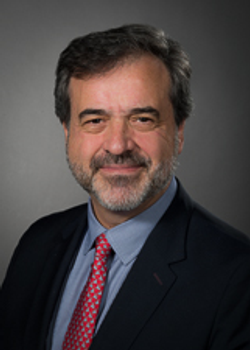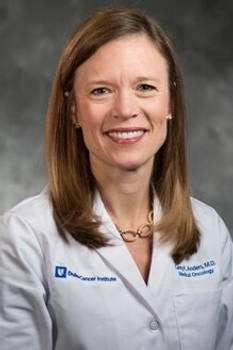MediFind found 9472 doctor with experience in HER-2 Positive Breast Cancer. Of these, 6808 are Experienced, 2411 are Advanced, 211 are Distinguished and 40 are Elite.
Yale University
Eric Winer is an Oncologist and a Hematologist Oncology provider in New Haven, Connecticut. Dr. Winer is rated as an Elite provider by MediFind in the treatment of HER-2 Positive Breast Cancer. His top areas of expertise are Breast Cancer, Triple-Negative Breast Cancer, HER-2 Positive Breast Cancer, and Breast Cancer in Men.
H Lee Moffitt Cancer Ctr And Res Inst Life Time Cancer Scrn Ctr Inc
Brian Czerniecki is a General Surgeon in Tampa, Florida. Dr. Czerniecki is rated as an Elite provider by MediFind in the treatment of HER-2 Positive Breast Cancer. His top areas of expertise are Breast Cancer, HER-2 Positive Breast Cancer, Triple-Negative Breast Cancer, Mastectomy, and Lymphadenectomy. Dr. Czerniecki is currently accepting new patients.
Valentina Guarneri practices in Padova, Italy. Ms. Guarneri is rated as an Elite expert by MediFind in the treatment of HER-2 Positive Breast Cancer. Her top areas of expertise are HER-2 Positive Breast Cancer, Breast Cancer, Triple-Negative Breast Cancer, Tissue Biopsy, and Mastectomy.
Dana-Farber Cancer Institute, Inc.
Sara Tolaney is a Hematologist Oncology specialist and an Oncologist in Boston, Massachusetts. Dr. Tolaney is rated as an Elite provider by MediFind in the treatment of HER-2 Positive Breast Cancer. Her top areas of expertise are Breast Cancer, HER-2 Positive Breast Cancer, Triple-Negative Breast Cancer, and Inflammatory Breast Cancer. Dr. Tolaney is currently accepting new patients.
Johns Hopkins University
Antonio Wolff is an Oncologist in Baltimore, Maryland. Dr. Wolff is rated as an Elite provider by MediFind in the treatment of HER-2 Positive Breast Cancer. His top areas of expertise are Breast Cancer, HER-2 Positive Breast Cancer, Triple-Negative Breast Cancer, and Inflammatory Breast Cancer. Dr. Wolff is currently accepting new patients.
Baylor College Of Medicine
Mothaffar Rimawi is a Hematologist Oncology specialist and a Hematologist in Houston, Texas. Dr. Rimawi is rated as an Elite provider by MediFind in the treatment of HER-2 Positive Breast Cancer. His top areas of expertise are Breast Cancer, HER-2 Positive Breast Cancer, Triple-Negative Breast Cancer, and Paget Disease of the Breast. Dr. Rimawi is currently accepting new patients.
Verdi Oncology Tennessee PC
Denise Yardley is a Hematologist and an Oncologist in Nashville, Tennessee. Dr. Yardley is rated as an Elite provider by MediFind in the treatment of HER-2 Positive Breast Cancer. Her top areas of expertise are Breast Cancer, HER-2 Positive Breast Cancer, Triple-Negative Breast Cancer, and Paget Disease of the Breast.
Maria Dieci practices in Padova, Italy. Dieci is rated as an Elite expert by MediFind in the treatment of HER-2 Positive Breast Cancer. Their top areas of expertise are Breast Cancer, Triple-Negative Breast Cancer, HER-2 Positive Breast Cancer, Tissue Biopsy, and Mastectomy.
Regents Of The University Of California
Hope Rugo is a Hematologist and an Oncologist in San Francisco, California. Dr. Rugo is rated as an Elite provider by MediFind in the treatment of HER-2 Positive Breast Cancer. Her top areas of expertise are Breast Cancer, Triple-Negative Breast Cancer, Agranulocytosis, Bone Marrow Aspiration, and Hormone Replacement Therapy (HRT).
Evandro De Azambuja-Azambuja practices in Brussels, Belgium. De Azambuja-Azambuja is rated as an Elite expert by MediFind in the treatment of HER-2 Positive Breast Cancer. Their top areas of expertise are Breast Cancer, HER-2 Positive Breast Cancer, Amenorrhea, Mastectomy, and Hormone Replacement Therapy (HRT).
Nadia Harbeck practices in Koeln, Germany. Ms. Harbeck is rated as an Elite expert by MediFind in the treatment of HER-2 Positive Breast Cancer. Her top areas of expertise are Breast Cancer, Agranulocytosis, Triple-Negative Breast Cancer, HER-2 Positive Breast Cancer, and Mastectomy.
Northwell Health Physician Partners Medical Oncology At MEETH
Francisco Esteva is an Oncologist in New York, New York. Dr. Esteva is rated as an Elite provider by MediFind in the treatment of HER-2 Positive Breast Cancer. His top areas of expertise are Breast Cancer, HER-2 Positive Breast Cancer, Inflammatory Breast Cancer, and Paget Disease of the Breast.
The Association Of University Physicians
Sara Hurvitz is a Hematologist Oncology specialist and a Hematologist in Seattle, Washington. Dr. Hurvitz is rated as an Elite provider by MediFind in the treatment of HER-2 Positive Breast Cancer. Her top areas of expertise are Breast Cancer, HER-2 Positive Breast Cancer, Metastatic Brain Tumor, Inflammatory Breast Cancer, and Bone Marrow Aspiration. Dr. Hurvitz is currently accepting new patients.
Duke Cancer Center
My clinical practice if focused on the care of patients with breast cancer, particularly those diagnosed at a younger age and those with recurrence in the central nervous system. I am committed to the care of patients with breast cancer brain metastases, and I am honored to serve as the Medical Director of the Brain and Spine Metastases Program in the Duke Cancer Center. In this role, our multidisciplinary team provides well-coordinated care for patients with breast cancer and other solid tumor types that have metastasized to the central nervous system. In addition, I enjoy helping young women diagnosed with breast cancer navigate their treatment decisions to ensure both excellent medical care and attention to individual challenges, such as future fertility, sequelae of treatment on longer-term health, and impact on current and future relationships. When not working, I enjoy running, reading, and traveling with my family. Dr. Anders is rated as an Elite provider by MediFind in the treatment of HER-2 Positive Breast Cancer. Her top areas of expertise are Breast Cancer, Brain Tumor, Triple-Negative Breast Cancer, and HER-2 Positive Breast Cancer.
Universita Degli Studi Di Milano
Giuseppe Curigliano practices in Milan, Italy. Mr. Curigliano is rated as an Elite expert by MediFind in the treatment of HER-2 Positive Breast Cancer. His top areas of expertise are Breast Cancer, Triple-Negative Breast Cancer, HER-2 Positive Breast Cancer, Mastectomy, and Tissue Biopsy.
City Of Hope Medical Foundation
Joanne Mortimer is an Oncologist in Duarte, California. Dr. Mortimer is rated as a Distinguished provider by MediFind in the treatment of HER-2 Positive Breast Cancer. Her top areas of expertise are Breast Cancer, Triple-Negative Breast Cancer, Inflammatory Breast Cancer, HER-2 Positive Breast Cancer, and Colonoscopy.
Aleix Prat practices in Barcelona, Spain. Mr. Prat is rated as an Elite expert by MediFind in the treatment of HER-2 Positive Breast Cancer. His top areas of expertise are HER-2 Positive Breast Cancer, Breast Cancer, Triple-Negative Breast Cancer, Mastectomy, and Endoscopy.
Yale University
Ian Krop is an Oncologist in New Haven, Connecticut. Dr. Krop is rated as an Elite provider by MediFind in the treatment of HER-2 Positive Breast Cancer. His top areas of expertise are HER-2 Positive Breast Cancer, Breast Cancer, Metastatic Brain Tumor, and Inflammatory Breast Cancer.
Federico Piacentini practices in Modena, Italy. Mr. Piacentini is rated as an Elite expert by MediFind in the treatment of HER-2 Positive Breast Cancer. His top areas of expertise are HER-2 Positive Breast Cancer, Breast Cancer, Triple-Negative Breast Cancer, Mastectomy, and Bone Graft.
Claudia Omarini practices in Modena, Italy. Ms. Omarini is rated as an Elite expert by MediFind in the treatment of HER-2 Positive Breast Cancer. Her top areas of expertise are HER-2 Positive Breast Cancer, Breast Cancer, BRCA Positive Breast Cancer, Pneumonia, and Mastectomy.
Last Updated: 10/30/2025














